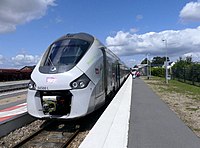
Photo from wikipedia
Partial hydrogenation of carbon–carbon double bonds is among one of the approaches to improve the low oxidative stability of vegetable biodiesel, which is an important drawback in biodiesel technology. In… Click to show full abstract
Partial hydrogenation of carbon–carbon double bonds is among one of the approaches to improve the low oxidative stability of vegetable biodiesel, which is an important drawback in biodiesel technology. In the current work, we developed an efficient two-phase catalytic system utilizing Pd(OAc)2 dissolved in polyethylene glycol (PEG) that in situ generates palladium nanoparticles in order to promote a selective partial hydrogenation reaction of methyl linoleate into mono-hydrogenated compounds while avoiding the generation of saturated compounds. High yield of methyl oleate was also obtained by hydrogenation of sunflower oil biodiesel using the same catalytic system. Through evaluating the palladium nanoparticles by TEM analysis, it is observed that 4 nm palladium nanoparticles generated in situ in PEG4000 showed high selectivity both for the partial hydrogenation of methyl linoleate and sunflower oil biodiesel.
Journal Title: ACS Sustainable Chemistry & Engineering
Year Published: 2017
Link to full text (if available)
Share on Social Media: Sign Up to like & get
recommendations!